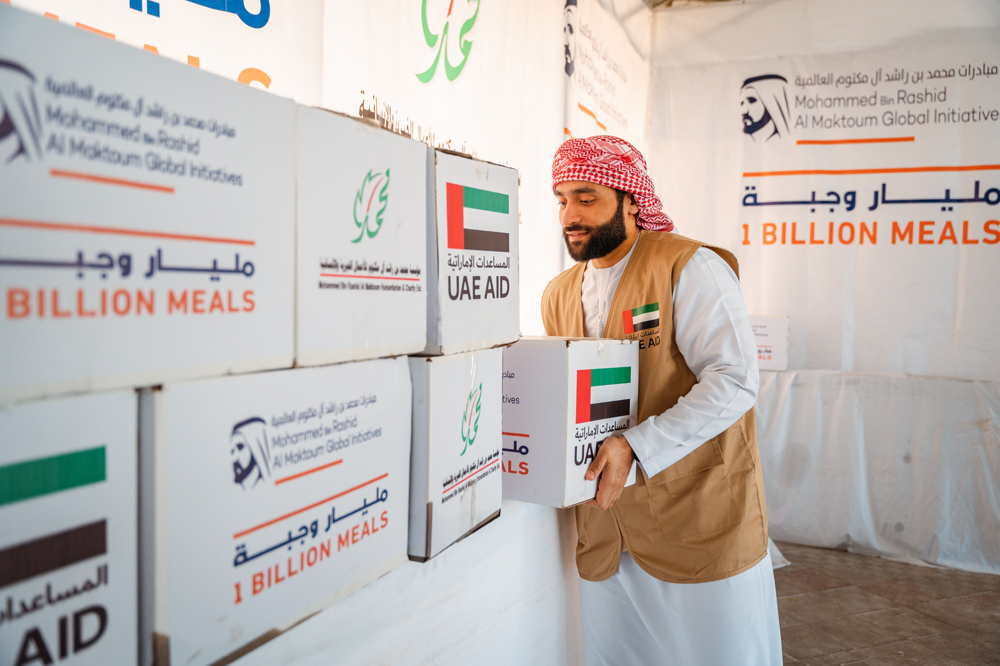Seizing the opportunity
As Western aid models falter, Abdulla N. Khoory makes the case for a more strategic and institutionalised approach to philanthropy in the GCC
Tuesday, 18 November 2025

As Western aid models falter, Abdulla N. Khoory makes the case for a more strategic and institutionalised approach to philanthropy in the GCC
Tuesday, 18 November 2025

 Abdulla N. Khoory is an Emirati entrepreneur and strategic advisor based in Dubai. He holds a Master’s in Education from Harvard University and a Bachelor’s in International Affairs from Northeastern University. Abdulla is the Founder of Two Point Five, a social innovation philanthropy advisory firm, and Co-Founder of NAWA, Oracle’s exclusive partner for government digitization. He previously served at the Abu Dhabi Executive Office and was a Senior Manager at Expo 2020 Dubai, where he oversaw the $100 million innovation grant program supporting 140 social enterprises across 76 countries. Abdulla is a Senior Fellow at Fiker Institute in the UAE.
Abdulla N. Khoory is an Emirati entrepreneur and strategic advisor based in Dubai. He holds a Master’s in Education from Harvard University and a Bachelor’s in International Affairs from Northeastern University. Abdulla is the Founder of Two Point Five, a social innovation philanthropy advisory firm, and Co-Founder of NAWA, Oracle’s exclusive partner for government digitization. He previously served at the Abu Dhabi Executive Office and was a Senior Manager at Expo 2020 Dubai, where he oversaw the $100 million innovation grant program supporting 140 social enterprises across 76 countries. Abdulla is a Senior Fellow at Fiker Institute in the UAE.
The global development landscape is undergoing a profound shift, marked by the retreat of traditional Western aid and the emergence of new philanthropic actors. Once peripheral to mainstream global development discourse, Gulf Cooperation Council (GCC) countries are now positioned to assert leadership through philanthropic models rooted in local ethics and South–South solidarity.
A growing number of GCC foundations (both private and state-affiliated) are engaging in transnational activities that closely resemble Official Development Assistance (ODA) or foreign aid.
When sovereign-backed entities such as Saudi Arabia’s King Salman Humanitarian Aid and Relief Centre or the United Arab Emirates’ (UAE) Mohammed bin Rashid Al Maktoum Global Initiatives operate across borders, they often serve as instruments of soft power. The emerging term ‘philanthro-diplomacy’ reflects this hybrid role.
GCC nations have also significantly expanded their official development assistance portfolios. From 2019 to 2022 the UAE, Saudi Arabia, Qatar, and Kuwait collectively contributed USD$28.9bn in ODA, with ODA-to-GNI ratios surpassing those of the US and the EU.
And, from 2010 to 2021, GCC states accounted for an average of 7.5 percent of global humanitarian funding, peaking at over 16 percent in 2018.
These figures highlight not only increasing financial commitments, but a prominent shift in geopolitical positioning.
GCC foundations are demonstrating alignment with global development priorities, with much of their philanthropic funding directed towards the education, health, and humanitarian sectors, areas traditionally championed by donors such as USAID.
These efforts are often driven by royal and government-affiliated philanthropic institutions, such as the Mohammed bin Rashid Al Maktoum Global Initiatives, the Qatar Foundation, the King Salman Humanitarian Aid and Relief centre, and Alwaleed Philanthropies.
GCC countries have an opportunity to redefine the architecture of global development by advancing approaches that are partnership based, locally anchored rather than externally imposed, and deeply attuned to the shared aspirations of the Global South.

The UAE has become a major humanitarian funder, delivering aid to crisis zones around the world.
As GCC countries expand their role in global development, there is a parallel opportunity to strengthen and mature their domestic philanthropic ecosystems.
While the region has made important progress, the philanthropic landscape remains in a formative stage, characterised by regulatory complexity, limited institutional infrastructure and a lack of incentives for private sector engagement.
Additionally, the GCC’s third sector faces a talent shortage that limits innovation in philanthropic practises.
Many nonprofit organisations continue to navigate operational challenges, including fragmented legal frameworks and a lack of dedicated mechanisms to enable long-term growth. Strategic coordination is further constrained by the absence of centralised data systems, common performance metrics, and transparent platforms to guide giving.
As a result, philanthropy often defaults to informal channels such as zakat and personal giving. These approaches, while deeply embedded in cultural and religious tradition, sometimes lack integration with national planning or measurable strategic long-term outcomes.
Yet the untapped potential is considerable. Estimates place the region’s total philanthropic capital between $52bn and $258bn, where the lower range is based on a conservative application of the 2.5 percent zakat obligation to the GCC’s combined GDP of $2.1trn.
These figures likely understate the true scale, given the prevalence of undocumented giving among high-net-worth individuals and family enterprises.
Notably, family businesses, which in the UAE comprise 90 percent of the private sector, remain largely unstructured in their philanthropic activities.
Shifting conditions present a timely opportunity for reform. The introduction of corporate taxation, the emergence of Environment, Social and Governance (ESG) norms, and growing interest in social investment provide GCC governments with a window to incentivise structured giving through tax benefits, regulatory modernisation, and public–private partnerships.
Unlocking this potential would position the nonprofit sector as a strategic contributor to national development and GDP. Globally, civil society organisations play key roles in job creation, service delivery, and civic engagement.
A centralised ‘National centre for Nonprofits’ or a GCC-wide coordination platform could enable more efficient deployment of philanthropic capital, catalyse innovation, and scale high-impact initiatives.
Framing philanthropy as ‘social R&D’ would further legitimise its role as a risk-taking arm of public problem-solving, testing solutions that governments may be slower or less equipped to implement.
"GCC philanthropy is undergoing a critical transformation... it is well-positioned to influence the future of global development."
A resilient philanthropic ecosystem also depends on improved transparency and data accessibility. To enable GCC philanthropy to play a transformative role in global devel-opment, particularly within a post-Western paradigm, GCC countries could implement number of comprehensive reforms across regulatory, institutional, and strategic dimensions.
These include:
Together, these measures can help position GCC philanthropy not only as a credible and strategic contributor to global development, but as a values-driven leader that offers a regionally grounded, globally relevant alternative to legacy aid frameworks.
GCC philanthropy is undergoing a critical transformation. Presenting an opportunity to anchor aid in local ethical traditions, fuelled by growing fiscal and strategic capacity, it is well-positioned to influence the future of global development. This transition coincides with a broader realignment of global power, as Western-led aid models recede, and the Global South asserts greater agency.
Through this approach, GCC countries can forge a new development paradigm rooted in justice, mutuality, and cultural authenticity. realising this vision requires investment in institutions, data infrastructure, human capital, and regulatory reform.
The goal is not to replicate or displace the West, but to build a more plural, grounded, and equitable development architecture, one shaped by local contexts and global solidarity.
GCC philanthropy can help define this new chapter by fusing context-driven traditions with strategy, and regional relevance with global leadership.
This article is an abridged version of an essay written for the Fiker Institute. You can read the original essay in full here.
It's a good idea to use a strong password that you're not using elsewhere.
Remember password? Login here
Our content is free but you need to subscribe to unlock full access to our site.
Already subscribed? Login here